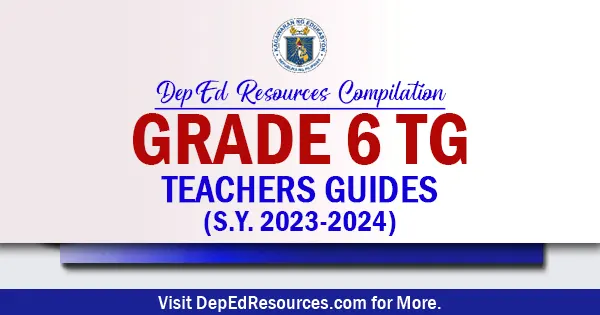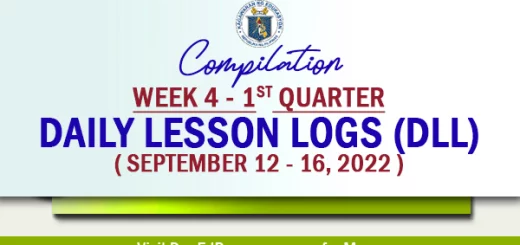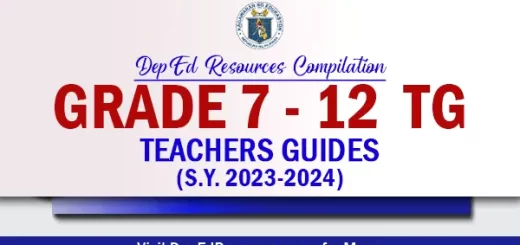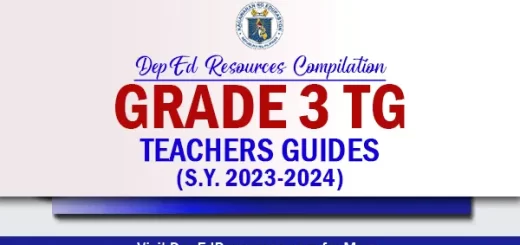Grade 6 Teachers Guide | K to 12 Curriculum
More Grade 6 Teachers Guides will be uploaded soon. You can always visit this page to check for newly uploaded files. Thank you.
Holistic Assessment
Assessment is an important aspect of learning and teaching. It should be effectively used to support the holistic development of our pupils. Our assessment practices should go beyond summative evaluation and move towards a more holistic approach.
Holistic assessment refers to the ongoing gathering of information on different facets of a child from various sources, with the aim of providing qualitative and quantitative feedback to support and guide the child’s development. Holistic assessment informs our teachers of their teaching practices and guides them in the design and delivery of student learning. It will also enable parents to support their children’s development and growth.
Characteristics of Assessment
1. Proximity to actual language use and performance
Assessment procedures should be based on activities that have authentic communicative function rather than ones with little or no intrinsic communicative value. These activities are based on actual performance in authentic situations which the learner is likely to encounter in his or her daily life.
2. A holistic view of language
Assessment procedures are based on the notion that the interrelationships among the various aspects of language, such as phonology, grammar, and vocabulary, among others cannot be ignored. Also the four skills of language-listening, speaking, reading, and writing-are seen to be parts of a structurally integrated whole.
Assessment approaches should be used for communication and self-expression. Assessment also takes into account the whole learner and his or her social, academic, and physical context.
3. An integrative view of learning
Assessment attempts to capture the learner’s total array of skills and abilities. It measures language proficiency in the context of specific subject matter. Assessment procedures are based on the idea that various aspects of a learner’s life, both academic and personal, are integral to the development of language proficiency and cannot be ignored. These dimensions include not only processes such as acquiring and integrating knowledge, extending and refining knowledge, and using knowledge meaningfully, but also issues such as varying student attitudes towards learning.
4. Developmental appropriateness
Assessment procedures set expectations that are appropriate within the cognitive, social, and academic development of the learner. This characteristic of assessment makes it particularly valuable for second language learners who come from culturally diverse backgrounds and who may have atypical educational experiences.
5. Multiple referencing
Assessment entails obtaining information about the learner from numerous sources and through various means.
For students, assessment should allow them to see their own accomplishments in terms that they understand and, consequently, allows them to assume responsibility for their learning. Assessment should allow parents to share in the educational process, and offers them a clear insight into what their children are doing in school. For teachers, the primary advantage of assessment is that it provides data on their students and their classroom for educational decision-making. In addition, it reports the success of the curriculum and provides teachers with a framework for organizing student’s works.

Grade 6 Teachers Guide | K to 12 Curriculum
ARALING PANLIPUNAN 6 Teacher’s Guide
ENGLISH 6 Teacher’s Guide
EPP 6 Teacher’s Guide
ESP 6 Teacher’s Guide
FILIPINO 6 Teacher’s Guide
- GRADE 6 Teacher’s Guide in FILIPINO – Halina . . . Magplano ng Pamilya
- GRADE 6 Teacher’s Guide in FILIPINO – Ako, Kami,Tayo
- GRADE 6 Teacher’s Guide in FILIPINO – WIKA AT PAGBASA
- GRADE 6 Teacher’s Guide in FILIPINO
MAPEH 6 Teacher’s Guide
MATHEMATICS 6 Teacher’s Guide
- GRADE 6 Teacher’s Guide in MATHEMATICS – Meter Reading
- GRADE 6 Teacher’s Guide in MATHEMATICS – Volume
- GRADE 6 Teacher’s Guide in MATHEMATICS – Circle Graph
- GRADE 6 Teacher’s Guide in MATHEMATICS – Book 1 – Whole Number Comprehension of whole number
- GRADE 6 Teacher’s Guide in MATHEMATICS – Book 2 – Rational Numbers, Decimals
- GRADE 6 Teacher’s Guide in MATHEMATICS – Book 3 – Rational Numbers Addition and Subtraction of Decimals
- GRADE 6 Teacher’s Guide in MATHEMATICS – Book 4 – Rational Numbers Multiplication of Decimals
- GRADE 6 Teacher’s Guide in MATHEMATICS – Book 5 – Rational Numbers Division of Decimals
- GRADE 6 Teacher’s Guide in MATHEMATICS – Book 6 – Rational Numbers Number Theory and Fractions
- GRADE 6 Teacher’s Guide in MATHEMATICS – Geometry
- GRADE 6 Teacher’s Guide in MATHEMATICS – Surface Area
- GRADE 6 Teacher’s Guide in MATHEMATICS
SCIENCE 6 Teacher’s Guide
Other Teacher’s Guides:
New! MELC Based Teachers Guides
- Teachers Guide for Teachers in Using the MELCs in KINDERGARTEN
- Teachers Guide for Teachers in Using the MELCs in ARALING-PANLIPUNAN
- Teachers Guide for Teachers in Using the MELCs in ENGLISH
- Teachers Guide for Teachers in Using the MELCs in EPP-TLE
- Teachers Guide for Teachers in Using the MELCs in ESP
- Teachers Guide for Teachers in Using the MELCs in FILIPINO
- Teachers Guide for Teachers in Using the MELCs in MATH
- Teachers Guide for Teachers in Using the MELCs in MOTHER-TONGUE
- Teachers Guide for Teachers in Using the MELCs in SCIENCE
MORE FREE TO DOWNLOAD FILES HERE
Budget of Work | Bulletin Board Display | Curriculum Guide | Daily Lesson Log | DepEd Announcements | DepEd Memo | DepEd News | DepEd Official Statements | DepEd Order | DepEd Press Releases | Designs and Templates | Detailed Lesson Plan | Diagnostic Test | Download Files Here | Exams | Forms | Graduation | Instructional Materials | Latest News | Latest! | Learners Material | Periodical Tests | Powerpoint Presentations | Reviewers | RPMS | School Forms | Summative Test | Teachers Guide | Teachers Manuals | Teachers Tools | Weekly Daily Lesson Log | Workbooks
These daily lesson log were made in compliance with the Department of Education format.
DepEd Resources credits these files to all the owners and authors as well as those who sent us this files for posting. We will always be thankful of you. You make DepEd Resources possible for our beloved teachers .
Please LIKE and SHARE so everyone would benefit from these files. Thank you!
LIKE US on Facebook! Click Here.
“I cannot do all the good that the world needs. But the world needs all the good that I can do.”
―
















Wala po ba tg na 2nd quarter grde 6 ty